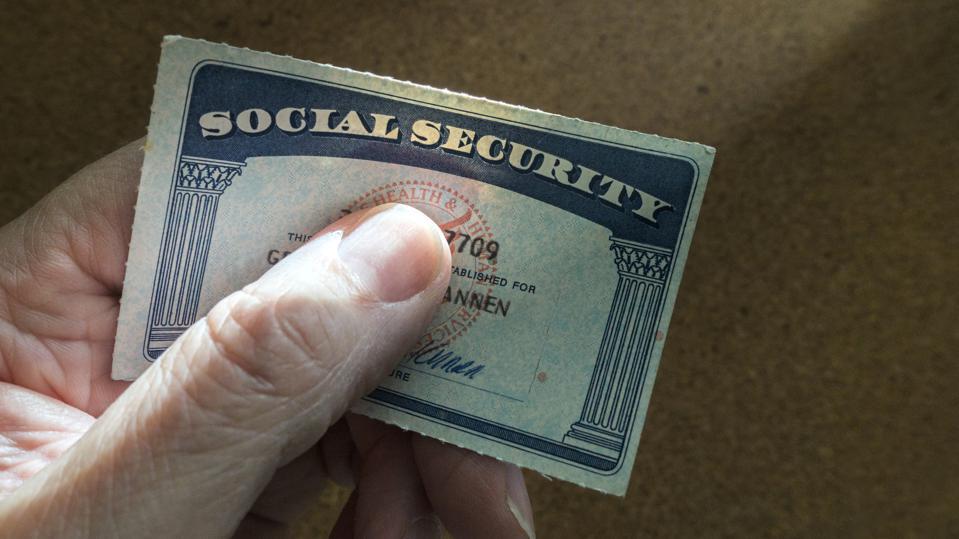What Can Someone Do With Your Social Security Number?
Hackers may have obtained the social security numbers of 60 to 80 percent of Americans. So what might happen if someone got hold of your Social Security number (SSN) and what can someone do with your social security number?
Author:Karan EmeryReviewer:Frazer PughFeb 03, 2023102.6K Shares1.4M Views

Hackers may have obtained the social security numbers of 60 to 80 percent of Americans. So what might happen if someone got hold of your Social Security number (SSN) and what can someone do with your social security number?
Scammers can steal your Social Security payments by using your SSN and other widely accessible personal information to register new accounts, use your name to get medical care, and more.
The method by which fraudsters obtain your SSN, the potential uses for it, and the steps you may take to avoid becoming a victim of Social Security theft are all covered in this article.
What Causes Social Security Theft?
When someone steals your SSN and uses it for fraud or identity theft, this is known as "social security theft." Unfortunately, it's now simpler than ever to obtain your SSN. The following are some of the primary methods that con artists use to steal your SSN:
Data Breaches That Reveal Private Information
A cyberattack is known as a "data breach" involves hackers stealing private data from businesses and services. Millions of pieces of private data have been stolen by hackers in recent years and sold on the Dark Web.
For instance, almost 50 million T-Mobile users' Social Security numbers and other personal information were stolen by thieves in August 2021. There have also been significant data breaches at Facebook, LinkedIn, Marriott, and Equifax.
Stolen Wallets With Social Security Cards
Scammers can obtain your Social Security card if they take your wallet, purse, or bag. The worst case scenario is that they might also take your credit cards and driver's license, giving them everything they need to steal your identity and engage in financial crime. When possible, avoid carrying your Social Security card on your person.
Phishing Attempts Using Phone Calls, Texts, Or Emails
Phishing is a type of social engineering attack in which con artists use phony emails, messages, or phone calls to persuade you to provide personal information by posing as representatives of companies or organizations.
Although the communications appear to be real, they contain harmful links that lead to fake websites where con artists can acquire your SSN.
Other phishing schemes involve con artists calling under the guise of Medicare or another government agency and requesting that you "check" your SSN.
Dumpster Diving And Stealing Your Mail
Fraudsters may use your trash to steal your identity if you discard outdated tax returns, medical bills, or financial records. Documents should be shredded before being discarded, as this is a preferable strategy.
What Can Someone Do With Your Stolen SSN?
The code to your identification, bank accounts, and more is your SSN. Scammers can perform the following when they get your SSN.

Here's What To Do After a Data Breach (7-Steps) | Aura
The detailed answer to the question of "what can someone do with your Social Security number" is given below:
Open Credit Accounts Or Take Out Loans In Your Name
Most fraudsters are driven by a desire for financial gain. Additionally, a stolen SSN gives them many chances to steal your money or ruin your credit. There were 363,092 instances of new credit card account fraud in 2020 alone
Fraudsters can open a credit card or loan in your name with just your SSN, name, and address. Once they've started a new account, they'll swiftly use up all of your credit and leave you with the bill, badly harming your credit score and making it harder for you to get credit in the future.
Create A Personal Bank Account
Your SSN, date of birth, and address are all that fraudsters need to register new bank accounts in your name. Some banks may, on rare occasions, request your driver's license as identification; scammers can supply it if they've taken your wallet.
Why is this important? Scammers can apply for overdraft protection, utilize bank accounts to launder money or accrue debt in your name.
Wipe Out Your Bank Account
If someone has access to your bank account information and has your SSN, they could take money from it. Nevertheless, doing this with just your SSN would be challenging.
Unfortunately, scammers frequently discover all the information they require on the Dark Web to empty your bank account as a result of data breaches.
Your passwords and account numbers may be included in this. Once inside, scammers transfer money using digital wallets like Zelle and Cash App to avoid leaving a digital trail.
Get A Fake Driver's License
Scammers who steal your SSN can use it to get a fake driver's license and use it to pass as you. This fraud, also referred to as criminal identity theft can be challenging to find. Arrest warrants and traffic citations filed in states you haven't been to, though, are some red flags.
If you have reason to believe that an identity thief has used your name to obtain a fake driver's license, get in touch with your state's Department of Motor Vehicles (DMV).
Make Use Of Your SSN To Pay For Medical Care
If an identity thief obtains your name and SSN, they can use it to obtain medical care and bill your health insurance provider. The average cost of resolving legal issues for victims of medical identity theft is $13,500.
Identity theft in the medical field, aside from tainting your medical records, may be fatal. You could, for example, be turned away from services or given the wrong care if the fraudster's medical history is mixed up with yours.
Create A Phone Number Account
If scammers have your address, name, and SSN, they can register a new phone account in your name. For example, a woman discovered her SSN had been stolen after receiving a Verizon Wireless bill for an account she did not open.
Commit Offenses That Will Be On Your Record
Your SSN can be used by someone who steals your identity to escape prosecution. When law enforcement apprehends fraudsters for a crime, they might, for instance, identify themselves using your name and SSN.
Your identity is now entangled in the scammer's criminal record, which prevents you from applying for employment that requires criminal background checks (in addition to tarnishing your reputation and causing other serious ramifications).

STOLEN Social Security Number? | This is What REALLY Happens
People Also Ask
What Can Someone Do With Your Social Security Number?
If someone has your SSN, they can use it to apply for employment, create bank accounts, gain credit, receive medical care, and steal government benefits while posing as you.
How Can I Find Out If Someone Is Using My Social Security Number?
It is difficult to determine if your Social Security number has been compromised. You can keep an eye on your bank accounts and credit reports, confirm your income with the Social Security Administration, and ask the IRS for tax transcripts.
What To Do If Someone Has Your Social Security Number?
If you think someone is using your SSN to work, get your tax refund, or engage in other tax fraud, call the Internal Revenue Service (IRS) or visit them online.
How Do You Put An Alert On Your Social Security Number For Free?
You can choose to place a fraud warning on the websites of any of the three main credit bureaus. (Only one credit bureau needs to be used. Any of the three bureaus will automatically alert the other two after you place a fraud alert with them.)
Conclusion
The truth is that it's quite challenging to commit fraud using merely someone's Social Security number. However, it is perilous to uncover someone's SSN on documents that also contain other personally identifiable information (PII). So, what can someone do with your Social Security number?
Your Social Security number and PII can be used by a threat actor to commit a variety of identity theft crimes. They may use this information, among other things, to seek loans, escape prosecution, or try to steal your tax refunds, social security benefits, or even health insurance.

Karan Emery
Author
Karan Emery, an accomplished researcher and leader in health sciences, biotechnology, and pharmaceuticals, brings over two decades of experience to the table. Holding a Ph.D. in Pharmaceutical Sciences from Stanford University, Karan's credentials underscore her authority in the field.
With a track record of groundbreaking research and numerous peer-reviewed publications in prestigious journals, Karan's expertise is widely recognized in the scientific community.
Her writing style is characterized by its clarity and meticulous attention to detail, making complex scientific concepts accessible to a broad audience. Apart from her professional endeavors, Karan enjoys cooking, learning about different cultures and languages, watching documentaries, and visiting historical landmarks.
Committed to advancing knowledge and improving health outcomes, Karan Emery continues to make significant contributions to the fields of health, biotechnology, and pharmaceuticals.

Frazer Pugh
Reviewer
Frazer Pugh is a distinguished expert in finance and business, boasting over 6 years of experience. Holding an MBA in Finance from Stanford University, Frazer's credentials underscore his authority and expertise in the field.
With a successful track record in executive roles and as a published author of influential articles on financial strategy, his insights are both deep and practical.
Beyond his professional life, Frazer is an avid traveler and culinary enthusiast, drawing inspiration from diverse cultures and cuisines.
His commitment in delivering trustworthy analysis and actionable advice reflects his dedication to shaping the world of finance and business, making a significant impact through his work.
Latest Articles
Popular Articles